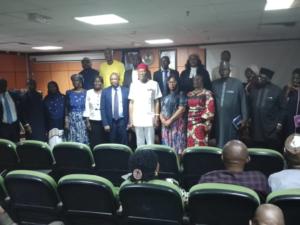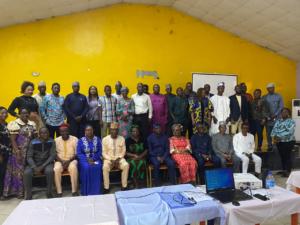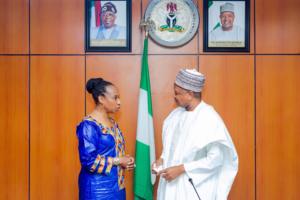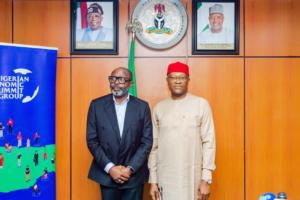GOALS & OBJECTIVES
- Coordinate the conduct of studies on innovations in Agriculture, Water Resources and Tourism sectors.
- Review and agree on sector objectives and priorities based on empirical facts in Agriculture, Water Resources and Tourism sectors.
- Collaborate with Agriculture, Water Resources, Culture & Tourism MDAs to obtain necessary data and information.
- Develop sector plans in Agriculture, Water Resources, Culture and Tourism sectors.
- Identify annual programme of activities and prepare the units’ annual budget
- Coordinate sectoral inputs for monitoring and evaluation, as well as articulation of Key Performance Indicators (KPIs) for MDAs in the sectors.
- Any other duties as would be delegated by the Management.
- To stimulate primary production to enhance the competitiveness of Nigeria’s real sector.
- To significantly increase production of processed and manufactured goods for export.
- To stimulate domestic and foreign trade in value-adding goods and services.
- To strengthen linkages between key sectors of the economy.
FUNCTIONS
- Fostering sustainable national development by providing professional insights through the conduct of extensive research and development of suitable programmes and policies that will stimulate sectoral growth and development.
- Preparation of quarterly advisory bulletin and quarterly policy advisory paper.
- Enhance the quality of inputs, policy and programmes of the sectors through the use of planning tools to enhance analysis and research.
- Provision of high quality inputs through data gathering, studies, research and use of graphical and statistical analytical tools.
AGRICULTURE, WATER RESOURCES, CULTURE & TOURISM
Conduct research and analysis of global and sector performance and trends towards identifying policy direction and setting realistic objectives in Agriculture, Water Resources and Tourism sectors.
OIL, GAS & SOLID MINERALS
- Develop presentations and speeches concerning the SMEs, Trade & Investment and Financial Services sectors.
- Coordinate sectoral inputs for monitoring and evaluation, as well as articulation of Key Performance Indicators (KPIs) for MDAs in the sectors.
- Any other duty as would be delegated by the Management.
TRADE & INVESTMENT, SME & FINANCIAL SERVICES
- Gather and analyze relevant data on national and global performance and trends in the SMEs, Trade & Investment and Financial Services sectors.
- Identify emerging innovations in the SMEs, Trade & Investment and Financial Services sectors and assess their implications for Nigeria.
- Develop objectives for the SMEs, Trade & Investment and Financial Services sectors as deduced from studies and relevant data.
- Provide relevant inputs for the development of the SMEs, Trade & Investment and Financial Services sector plans.
- Compile priority programmes and projects for the SMEs, Trade & Investment and Financial Services sectors and aggregate their costs.
- Relate with the Organized Private Sector (OPS) in actualizing the goals and targets set for the extractive industry in the 1st NIP of the NV20:2020.
- Appraise all developmental programmes in the sector and work with development partners to actualize the goals and targets in the vision document
- Identify annual programmes of activities and prepare the unit’s annual budget.
- Relates and guide relevant MDAs to actualize targets set in the 1st NIP of NV20:2020.
- Any other duty as would be delegated by the Management
SCIENCE, TECHNOLOGY & TELECOMMUNICATIONS
- Develop Institutional Framework for the policy implementation of relevant Ministries and agencies under the purview of the Unit.
- Liaise, co-ordinate, collaborate and monitor programmes/projects of activities of relevant MDAs to ensure that they are in line with the Nigeria Vision 20:2020.
- Collaborate with relevant MDAs and/or obtain necessary data and information as well as develop Key Performance Indicators (KPIs) and ensure that the score cards are being completed in accordance with the set guidelines.
- Participate effectively in developing sector plans, as well as review and agree on the existing sector objectives and priorities based on empirical facts
- Gather and analyze relevant data from MDAs for effective planning.
- Monitor trends, performance and activities in the sector through collection, collation and analysis of relevant data.
- articipate and represent the Commission at various meetings, workshops and seminars.
- Collaborate with donor agencies and other stakeholders to ensure consistency in furthering the growth and development of the sectors.
- Relates and guide relevant MDAs to actualize targets set in the 1st NIP of NV20:2020.
- Any other duty as would be delegated by the Management
- Prepare briefs and reports on meetings, workshops and seminars attended for policy formulation and fine tuning.
PAPERS & PUBLICATIONS
- The Nigerian Business Climate
- Toward Improved fertilizer Subsidy program in Nigeria
- National Policy on Food and Nutrition Document
- Paper on The Gulf of Guinea: The Nigerian Gas Master Plan and Opportunities for the Development of Gas Infrastructure
- Presentation on The Gulf of Guinea: The Nigerian Gas Master Plan and Opportunities for the Development of Gas Infrastructure
The Department is headed by Mrs Elizabeth Egharevba as the Director





